- Home
- F. Paul Wilson
Adversary Cycle 01 - The Keep Page 2
Adversary Cycle 01 - The Keep Read online
Page 2
Ages ago a huge flat slab of rock had thrust itself out from the western wall of the pass. Around it ran a deep gorge through which flowed an icy stream that appeared to spring from within the mountain. The keep sat on that slab. Its walls were sleek, perhaps forty feet high, made of granite block, melting seamlessly into the granite of the mountainside at its rear—the work of man somehow at one with the work of nature. But the most striking feature of the small fortress was the solitary tower that formed its leading edge: flat-topped, jutting out toward the center of the pass, at least 150 feet from its notched parapet to the rocky gorge below. That was the keep. A holdover from a different age. A welcome sight in that it assured dry living quarters during their watch over the pass.
But strange the way it looked so new . . .
Woermann nodded to the man next to him in the car and began folding the map. His name was Oster, a sergeant; the only sergeant in Woermann's command. He doubled as a driver. Oster signaled with his left hand and the car moved forward with the other three vehicles following. The road—or trail, rather—widened as they swung farther around the bend and came to rest in a tiny village nestled against the mountainside south of the keep, just across the gorge from it.
As they followed the trail into the center of the village, Woermann decided to reclassify that as well. This was no village in the German sense; this was a collection of stucco-walled, shake-roofed huts, all single-story affairs except for the one at the northernmost end. This stood to the right, had a second floor and a sign out front. He didn't read Romanian but had a feeling it was an inn of sorts. Woermann couldn't imagine the need for an inn. Who would ever come here?
A few hundred feet or so beyond the village the trail ended at the edge of the gorge. From there a timbered causeway supported by stone columns spanned the 200 feet or so across the rocky gorge, providing the keep's sole link to the world. The only other possible means of entry were to scale its sheer stone walls from below, or to slide and rappel down a thousand feet of equally sheer mountainside from above.
Woermann's practiced military eye immediately assessed the strategic values of the keep. An excellent watchpost. This entire stretch of the Dinu Pass would be in plain view from the tower; and from the keep's walls fifty good men could hold off an entire battalion of Russians. Not that Russians would ever be coming through the Dinu Pass, but who was he to question High Command?
There was another eye within Woermann, and it was assessing the keep in its own way. An artist's eye, a landscape lover's . . . to use water colors, or to trust oil pigment to catch that hint of brooding watchfulness? The only way to find out would be to try them both. He would have plenty of free time during the coming months. .
"Well, Sergeant," he said to Oster as they halted at the edge of the causeway, "what do you think of your new home?"
"Not much, sir."
"Get used to it. You'll probably be spending the rest of the war here."
"Yes, sir."
Noting an uncharacteristic stiffness in Oster's replies, Woermann glanced at his sergeant, a slim, dark man only slightly more than half Woermann's age.
"Not much war left anyway, Sergeant. Word came as we set out that Yugoslavia has surrendered."
"Sir, you should have told us! It would have lifted our spirits!"
"Do they need lifting so badly?"
"We'd all prefer to be in Greece at the moment, sir. "
"Nothing but thick liquor, tough meat, and strange dancing there. You wouldn't like it. "
"For the fighting, sir."
"Oh, that."
Woermann had noticed the facetious turn of his mind moving closer and closer to the surface during the past year. Not an enviable trait in any German officer and potentially dangerous to one who had never become a Nazi. But it was his only defense against his mounting frustration at the course of the war and of his career. Sergeant Oster had not been with him long enough to realize this. He'd learn in time, though.
"By the time you got there, Sergeant, the fighting would be over. I expect surrender within the week.”
"Still, we all feel we could be doing more for the Führer there than in these mountains."
"You shouldn't forget that it is your Führer's will that we be stationed here." He noted with satisfaction that the' 'your" slipped right by Oster.
"But why, sir? What purpose do we serve?"
Woermann began his recitation: "High Command considers the Dinu Pass a direct link from the steppes of Russia to all those oil fields we passed at Ploiesti. Should relations between Russia and the Reich ever deteriorate, the Russians might decide to launch a sneak attack at Ploiesti. And without that petrol, the Wehrmacht's mobility would be seriously impaired."
Oster listened patiently despite the fact that he must have heard the explanation a dozen times before and had himself given a version of the same story to the men in the detachment. Yet Woermann knew he remained unconvinced. Not that he blamed him. Any reasonably intelligent soldier would have questions. Oster had been in the army long enough to know that it was highly irregular to place a seasoned veteran officer at the head of four infantry squads with no second officer, and then to assign the entire detachment to an isolated pass in the mountains of an ally state. It was a job for a green lieutenant.
"But the Russians have plenty of their own oil, sir, and we have a treaty with them."
"Of course I How stupid of me to forget! A treaty. No one breaks treaties anymore."
"You don't think Stalin would dare betray the Führer, do you?"
Woermann bit back the reply that leaped to mind: Not if your Fuhrer can betray him first.
Oster wouldn't understand. Like most members of the postwar generation, he had come to equate the best interests of the German people with the will of Adolf Hitler. He had been inspired, inflamed by the man. Woermann had found himself far too old for such infatuation. He had celebrated his forty-first birthday last month. He had watched Hitler move from beer halls, to the Chancellory, to godhood. He had never liked him.
True, Hitler had united the country and had started it on the road to victory and self-respect again, something for which no loyal German could fault him. But Woermann had never trusted Hitler, an Austrian who surrounded himself with all those Bavarians—all southerners. No Prussian could trust a bunch of southerners like that. Something ugly about them. What Woermann had witnessed at Posnan had shown him just how ugly.
"Tell the men to get out and stretch," he said, ignoring Oster's last question. It had been rhetorical, anyway. "Inspect the causeway to see if it will support the vehicles while I go over and take a look inside."
As he walked the length of the causeway, Woermann thought its timbers looked sturdy enough. He glanced over the edge at the rocks and gurgling water below. A long way down—sixty feet at least. Best to have the lorries and the supply truck empty but for their drivers, and to bring them across one at a time.
The heavy wooden gates in the keep's entrance arch were wide open, as were the shutters on most of the windows in the walls and the tower. The place seemed to be airing out. Woermann strolled through the gates and into the cobblestone courtyard. Cool and quiet here. He noticed that the keep had a rear section, apparently carved into the mountain, that he hadn't noticed from the causeway.
He turned around slowly. The tower loomed over him; gray walls surrounded him on every side. He felt as if he were standing within the arms of a huge slumbering beast, one he dared not awaken.
Then he saw the crosses. The inner walls of the courtyard were studded with hundreds of them . . . thousands of them. All the same size and shape, all the same unusual design: The upright was a good ten inches high, squared at the top and lipped at the base; the crosspiece measured about eight inches and had a slight upward angle at each end. But the odd part was how high the crosspieces were set upon the uprights—any higher and the cross would have become an upper-case ''T."
Woermann found them vaguely disturbing . . . something wrong about the
m. He stepped over to the nearest cross and ran his hand over its smooth surface. The upright was brass and the crosspiece nickel, all skillfully inlaid into the surface of the stone block.
He looked around again. Something else bothered him. Something was missing. Then it hit him—birds. There were no pigeons on the walls. Castles in Germany had flocks of pigeons about them, nesting in every nook and cranny. He couldn’t find a single bird anywhere on the walls, the windows, or the tower.
He heard a sound behind him and whirled, unsnapping the flap on his holster and resting his palm on the butt of his Luger. The Romanian government might be an ally of the Reich, but Woermann was well aware that there were groups within its borders that were not. The National Peasant Party, for instance, was fanatically anti-German; it was out of power now but still active. There might be violent splinter groups here in the Alps, hiding, waiting for a chance to kill a few Germans.
The sound was repeated, louder now. Footsteps, relaxed, with no attempt at stealth. They came from a doorway in the rear section of the keep, and as Woermann watched, a thirtyish man in a sheepskin cojoc stepped through the opening. He didn't see Woermann. He carried a mortar-filled palette held in his hand and, squatting with his back to Woermann, began to patch some crumbling stucco around the doorframe.
"What are you doing here?" Woermann barked. His orders had implied that the keep was deserted.
Startled, the mason leaped up and spun around, the anger in his face dying abruptly as he recognized the uniform and realized that he had been addressed in German. He gibbered something unintelligible—something in Romanian, no doubt. Woermann realized with annoyance that he'd either have to find an interpreter or learn some of the language if he was going to spend any time here.
"Speak German! What are you doing here?"
The man shook his head in a mixture of fear and indecision. He held up an index finger, a signal to wait, then shouted something that sounded like "Papa!" A shutter clattered open above as an older man with a woolly caciula on his head leaned out of one of the tower windows and looked down. Woermann's. grip tightened on the butt of his Luger as the two Romanians carried on a brief exchange. Then the older one called down in German:
"I'll be right down, sir."
Woermann nodded and relaxed. He went again to one of the crosses and examined it. Brass and nickel . . . almost looked like gold and silver.
"There are sixteen thousand eight hundred and seven such crosses imbedded in the walls of this keep," said a voice behind him. The accent was thick, the words practiced. .
Woermann turned. "You've counted them?" He judged the man to be in his mid-fifties, with a strong family resemblance between him and the younger mason he had startled. Both were dressed in identical peasant shirts and breeches except for the older man's woolly hat. "Or is that just something you tell your tour customers?"
"I am Alexandru," he said stiffly, bowing slightly at the waist. "My sons and I work here. And we take no one on tours."
"That will change in a moment. But right now: I was led to believe the keep was unoccupied."
"It is when we go home at night. We live in the village."
"Where's the owner?"
Alexandru shrugged. "I have no idea."
"Who is he?"
Another shrug. "I don't know."
"Who pays you, then?" This was getting exasperating. Didn't this man know how to do anything other than shrug and say he didn't know?
"The innkeeper. Someone brings money to him twice a year, inspects the keep, makes notes, then leaves. The innkeeper pays us monthly."
"Who tells you what to do?" Woermann waited for another shrug but it did not come.
"No one." Alexandru stood straight and spoke with quiet dignity. "We do everything. Our instructions are to maintain the keep as new. That's all we need to know. Whatever needs doing, we do. My father spent his life doing it, and his father before him, and so on. My sons will continue after me."
"You spend your entire lives maintaining this building? I can't believe that!"
"It's bigger than it looks. The walls you see around you have rooms within them. There are corridors of rooms below us in the cellar and carved into the mountainside behind us. Always something to be done."
Woermann's gaze roamed up the sullen walls, half in shadow, and down to the courtyard again, already deep in shadow despite the fact that it was early afternoon. Who had built the keep? And who was paying to have it maintained in such perfect condition? It didn't make sense. He stared at the shadows and it occurred to him that had he been the keep's builder he would have placed it on the other side of the pass where there was a better southern and western exposure to the light and the warmth of the sun. As it was situated, night must always come early to this place.
"Very well," he told Alexandru. "You may continue your maintenance tasks after we settle in. But you and your sons must check with the sentries when you enter and leave." He saw the older man shaking his head. "What's wrong?"
"You cannot stay here."
"And why not?"
"It is forbidden."
"Who forbids?"
Alexandru shrugged. "It's always been that way. We are to maintain the keep and see to it that no one trespasses. "
"And of course, you're always successful." The old man's gravity amused him.
"No. Not always. There have been times when travelers have stayed against our wishes. We do not resist them—we have not been hired to fight. But they never stay more than one night. Most not even that long. "
Woermann smiled. He had been waiting for this. A deserted castle, even a pocket-sized one such as this, had to be haunted. If nothing else, it would give the men something to talk about.
"What drives them away? Moaning? Chain-rattling spectres?"
"No . . . no ghosts here, sir."
"Deaths then? Gruesome murders? Suicides?" Woermann was enjoying himself. "We have more than our share of castles in Germany, and there's not a one that doesn't have some fireside scare story connected with it. "
Alexandru shook his head. "No one's ever died here. Not that I know of."
"Then what? What drives trespassers out after only one night?"
"Dreams, sir. Bad dreams. And always the same, from what I can gather . . . something about being trapped in a tiny room with no door and no windows and no lights . . . utter darkness . . . and cold . . . very cold . . . and something in the dark with you . . . colder than the dark . . . and hungry."
Woermann felt a hint of a chill across his shoulders and down his back as he listened. It had been on his mind to ask Alexandru if he himself had ever spent a night in the keep, but the look in the Romanian's eyes as he spoke was answer enough. Yes, Alexandru had spent a night in the keep. But only once.
"I want you to wait here until my men are across the causeway," he said, shaking off the chill. "Then you can give me a tour."
Alexandru's face was a study in helpless frustration. "It is my duty, Herr Captain," he said with stern dignity, "to inform you that no lodgers are allowed here in the keep."
Woermann smiled, but with neither derision nor condescension. He understood duty and respected this man's sense of it.
"Your warning has been delivered. You are faced with the German Army, a force beyond your power to resist, and so you must step aside. Consider your duty faithfully discharged."
This said, Woermann turned and moved toward the gate. He still had seen no birds. Did birds have dreams?
Did they, too, nest here for one night and never return?
The command car and the three unloaded trucks were driven across the causeway and parked in the courtyard without incident. The men followed on foot, carrying their own gear, then returned to the other side of the gorge to begin bringing over the contents of the supply truck—food, generators, antitank weapons—by hand.
While Sergeant Oster took charge of the work details, Woermann followed Alexandru on a quick tour of the keep. The number of identical brass-and-nickel
crosses inlaid at regular intervals in the stones of every corridor, every room, every wall, continued to amaze him. And the rooms . . . they seemed to be everywhere: within the walls girding the courtyard, under the courtyard, in the rear section, in the watchtower. Most of them were small; all were unfurnished.
"Forty-nine rooms in all, counting the suites in the tower," Alexandru said.
"An odd number, don't you think? Why not round it off to fifty?"
Alexandru shrugged. "Who is to say?"
Woermann ground his teeth. If he shrugs once more . . .
They walked along one of the rampart walls that ran out diagonally from the tower then angled straight back to the mountain. He noted crosses imbedded in the breast-high parapet, too. A question rose in his mind: "I don't recall seeing any crosses in the outer aspect of the wall."'
"There aren't any. Only on the inside. And look at the blocks here. See how perfectly they fit. Not a speck of mortar is used to hold them together. All the walls in the keep are constructed this way. It's a lost art."
Woermann didn't care about stone blocks. He indicated the rampart beneath their feet. "You say there are rooms below us here?"
"Two tiers of them within each wall, each with a slit window through the outer wall, and a door to a corridor leading to the courtyard."
"Excellent. They'll do nicely for barracks. Now to the tower."
The watchtower was of unusual design. It had five levels, each consisting of a two-room suite that took up all of the level save the space required for a door onto a small exposed landing. A stone stairway climbed the inner surface of the tower's northern wall in a steep zigzag.

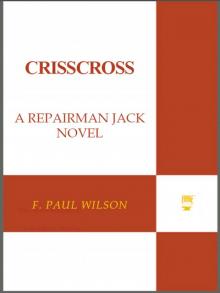 Crisscross
Crisscross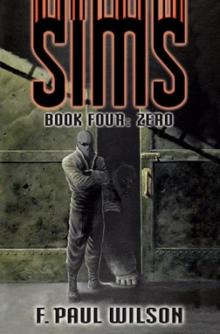 Ground Zero
Ground Zero Short Stories
Short Stories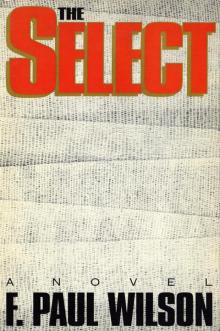 The Select
The Select Codename
Codename Bloodline
Bloodline A Soft Barren Aftershock
A Soft Barren Aftershock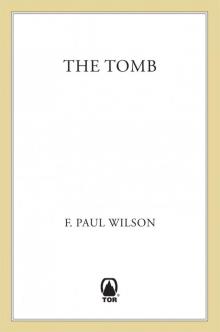 The Tomb
The Tomb The Complete LaNague
The Complete LaNague The Tery
The Tery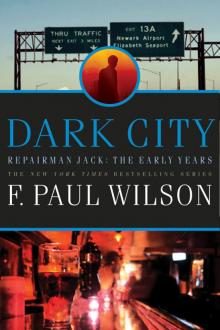 Dark City
Dark City Deep as the Marrow
Deep as the Marrow The Fifth Harmonic
The Fifth Harmonic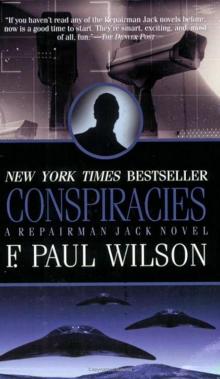 Conspiracies
Conspiracies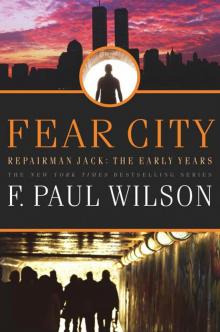 Fear City
Fear City Wheels Within Wheels
Wheels Within Wheels Wayward Pines
Wayward Pines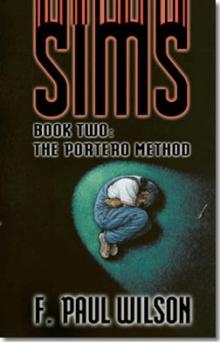 The Portero Method
The Portero Method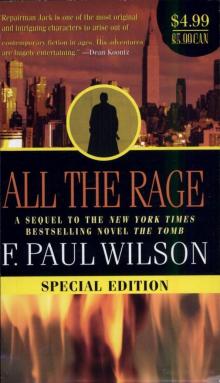 All the Rage
All the Rage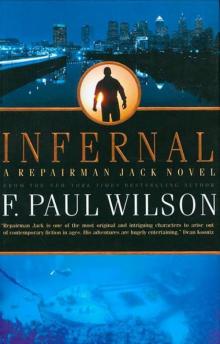 Infernal
Infernal The Barrens & Others
The Barrens & Others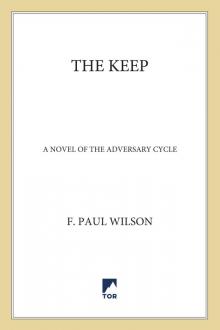 The Keep
The Keep Quick Fixes: Tales of Repairman Jack
Quick Fixes: Tales of Repairman Jack Virgin
Virgin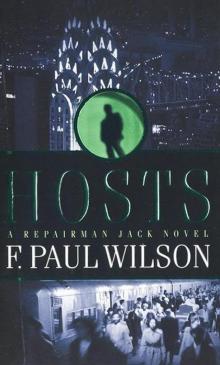 Hosts
Hosts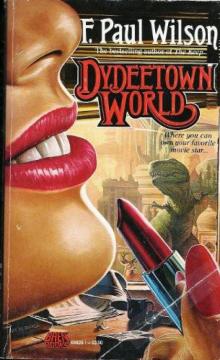 Dydeetown World
Dydeetown World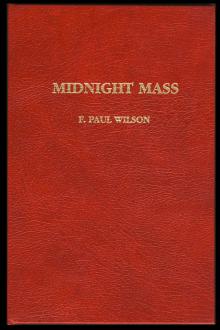 Midnight Mass
Midnight Mass Black Wind
Black Wind The Christmas Thingy
The Christmas Thingy The Last Rakosh
The Last Rakosh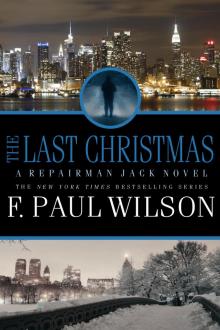 The Last Christmas: A Repairman Jack Novel
The Last Christmas: A Repairman Jack Novel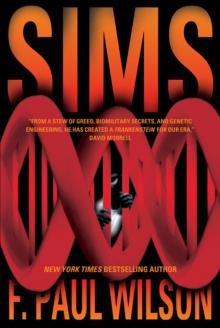 SIMS
SIMS Thy Brother's Keeper
Thy Brother's Keeper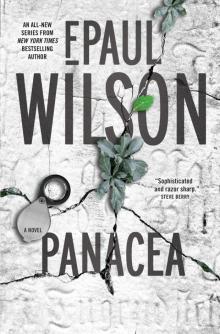 Panacea
Panacea The Touch
The Touch Scenes from the Secret History
Scenes from the Secret History Scenes From the Secret History (The Secret History of the World)
Scenes From the Secret History (The Secret History of the World)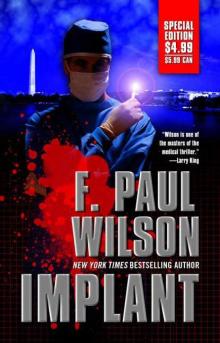 Implant
Implant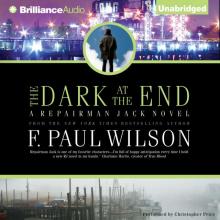 The Dark at the End
The Dark at the End Fatal Error
Fatal Error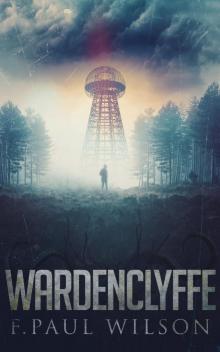 Wardenclyffe
Wardenclyffe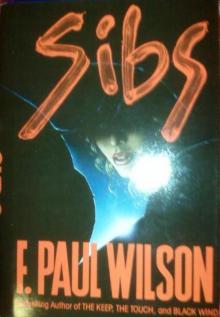 Sibs
Sibs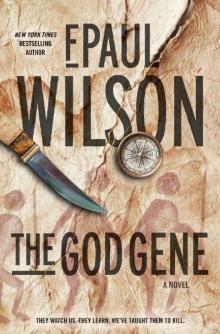 The God Gene
The God Gene The Void Protocol
The Void Protocol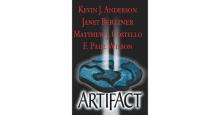 Artifact
Artifact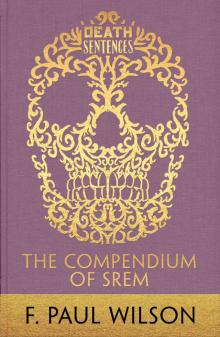 The Compendium of Srem
The Compendium of Srem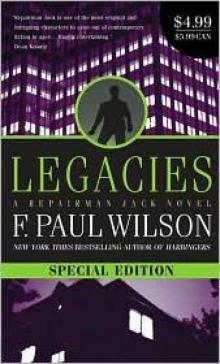 Legacies
Legacies Reprisal
Reprisal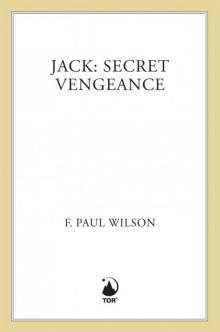 Jack: Secret Vengeance
Jack: Secret Vengeance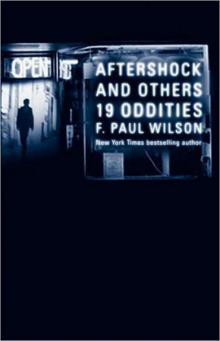 Aftershock & Others: 19 Oddities
Aftershock & Others: 19 Oddities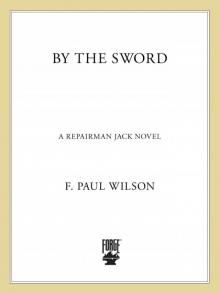 By the Sword
By the Sword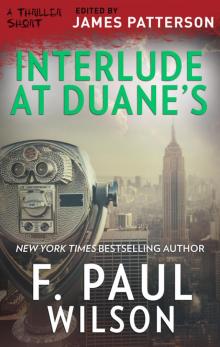 Interlude at Duane's (Thriller: Stories to Keep You Up All Night)
Interlude at Duane's (Thriller: Stories to Keep You Up All Night)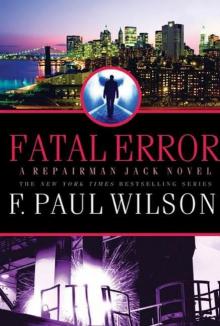 Fatal Error rj-13
Fatal Error rj-13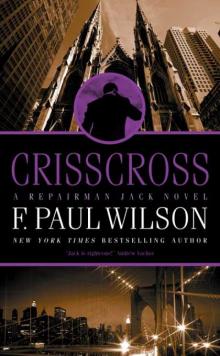 Crisscross rj-8
Crisscross rj-8 Codename: Chandler: Fix (Kindle Worlds Novella)
Codename: Chandler: Fix (Kindle Worlds Novella)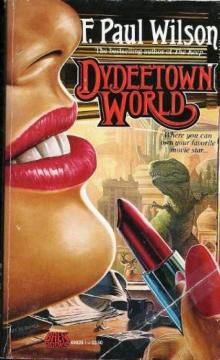 Dydeetown World lf-4
Dydeetown World lf-4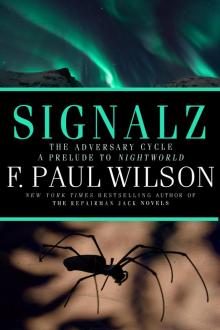 Signalz
Signalz Codename_Chandler_Fix
Codename_Chandler_Fix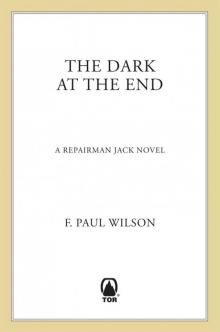 The Dark at the End (Repairman Jack)
The Dark at the End (Repairman Jack) The Complete Adversary Cycle: The Keep, the Tomb, the Touch, Reborn, Reprisal, Nightworld (Adversary Cycle/Repairman Jack)
The Complete Adversary Cycle: The Keep, the Tomb, the Touch, Reborn, Reprisal, Nightworld (Adversary Cycle/Repairman Jack)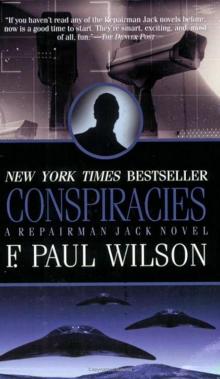 Repairman Jack 03 - Conspiracies
Repairman Jack 03 - Conspiracies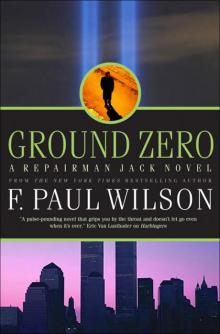 Ground Zero rj-13
Ground Zero rj-13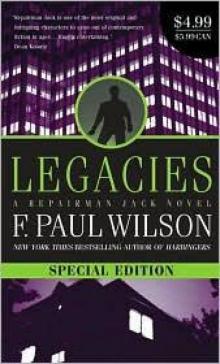 Repairman Jack 02 - Legacies
Repairman Jack 02 - Legacies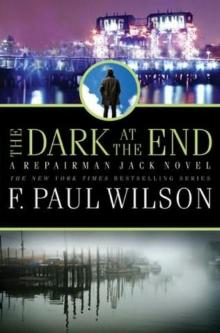 The Dark at the End rj-15
The Dark at the End rj-15![Repairman Jack [02]-Legacies Read online](http://i1.bookreadfree.com/i/03/21/repairman_jack_02-legacies_preview.jpg) Repairman Jack [02]-Legacies
Repairman Jack [02]-Legacies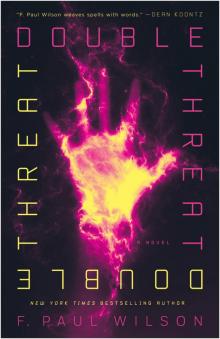 Double Threat
Double Threat The Tery lf-5
The Tery lf-5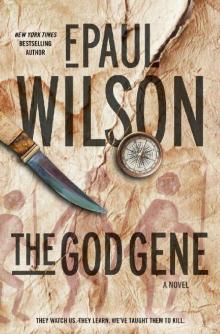 The God Gene: A Novel
The God Gene: A Novel Wayward Pines: The Widow Lindley (Kindle Worlds Novella)
Wayward Pines: The Widow Lindley (Kindle Worlds Novella)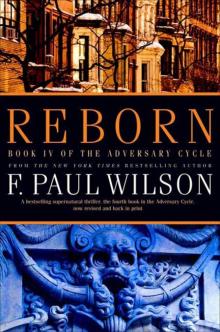 Reborn ac-4
Reborn ac-4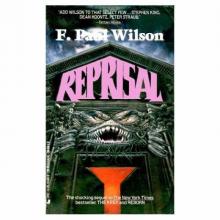 Reprisal ac-5
Reprisal ac-5 New Title 1
New Title 1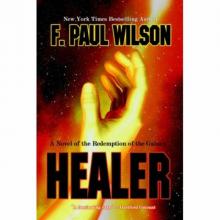 Healer lf-3
Healer lf-3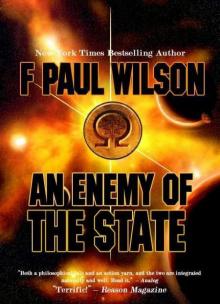 An Enemy of the State lf-1
An Enemy of the State lf-1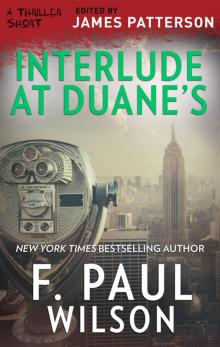 Interlude at Duane's
Interlude at Duane's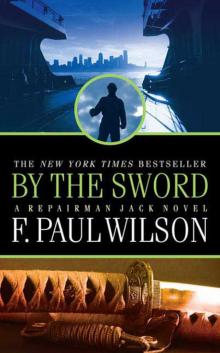 By the Sword rj-12
By the Sword rj-12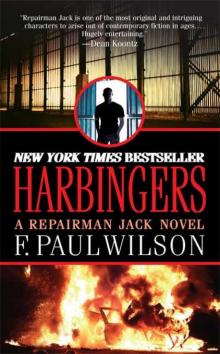 Hardbingers rj-10
Hardbingers rj-10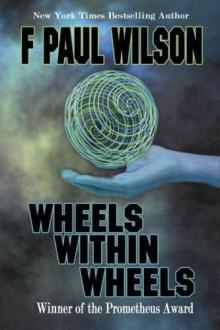 Wheels Within Wheels lf-2
Wheels Within Wheels lf-2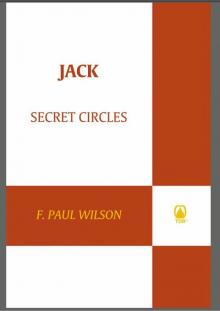 Jack: Secret Circles
Jack: Secret Circles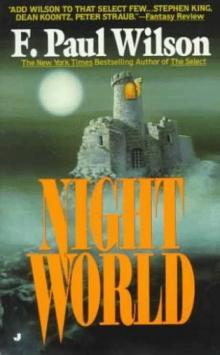 Nightworld ac-6
Nightworld ac-6 Quick Fixes - tales of Repairman Jack
Quick Fixes - tales of Repairman Jack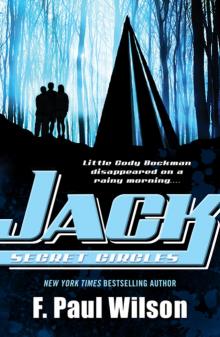 Secret Circles yrj-2
Secret Circles yrj-2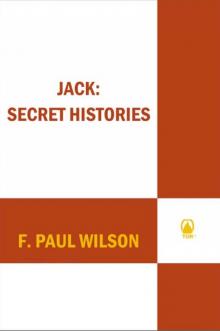 Jack: Secret Histories
Jack: Secret Histories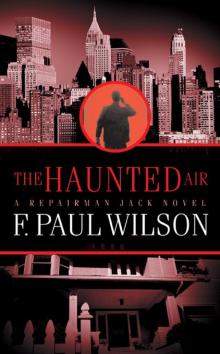 Haunted Air rj-6
Haunted Air rj-6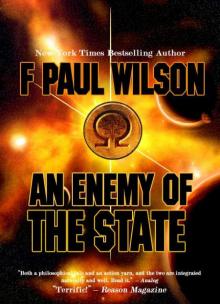 An Enemy of the State - a novel of the LaNague Federation (The LaNague Federation Series)
An Enemy of the State - a novel of the LaNague Federation (The LaNague Federation Series)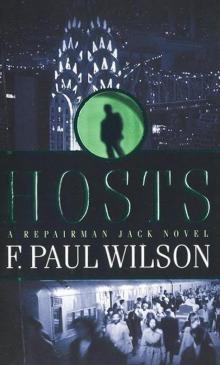 Repairman Jack 05 - Hosts
Repairman Jack 05 - Hosts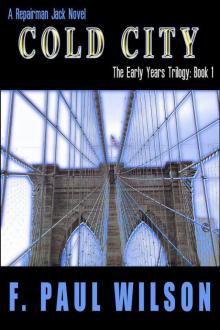 Cold City (Repairman Jack - the Early Years Trilogy)
Cold City (Repairman Jack - the Early Years Trilogy)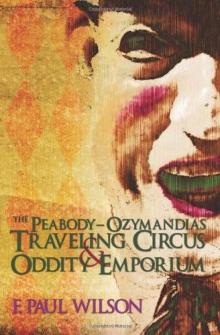 The Peabody-Ozymandias Traveling Circus & Oddity Emporium
The Peabody-Ozymandias Traveling Circus & Oddity Emporium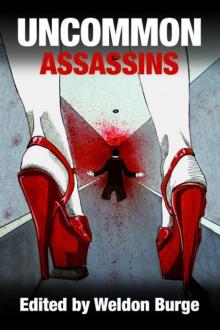 Uncommon Assassins
Uncommon Assassins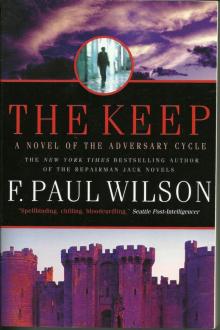 Adversary Cycle 01 - The Keep
Adversary Cycle 01 - The Keep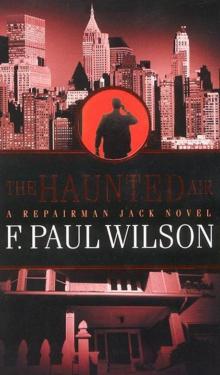 Repairman Jack 06 - The Haunted Air
Repairman Jack 06 - The Haunted Air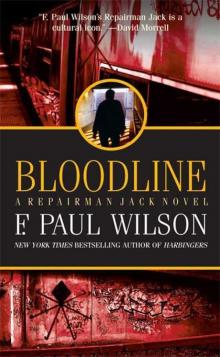 Bloodline rj-11
Bloodline rj-11 Ultimate Supernatural Horror Box Set
Ultimate Supernatural Horror Box Set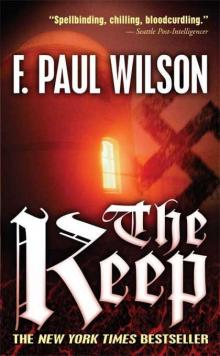 The Keep ac-1
The Keep ac-1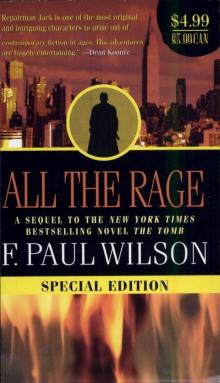 Repairman Jack 04 - All the Rage
Repairman Jack 04 - All the Rage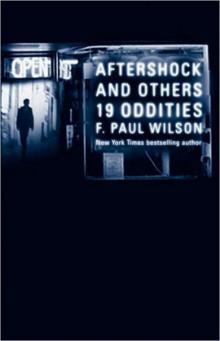 Aftershock & Others
Aftershock & Others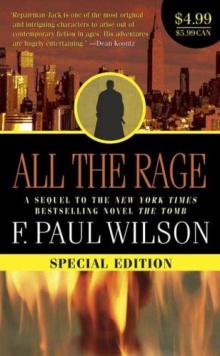 All the Rage rj-4
All the Rage rj-4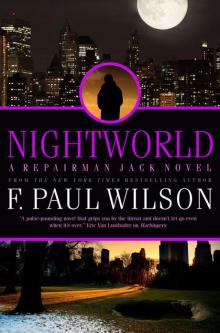 Nightworld (Adversary Cycle/Repairman Jack)
Nightworld (Adversary Cycle/Repairman Jack)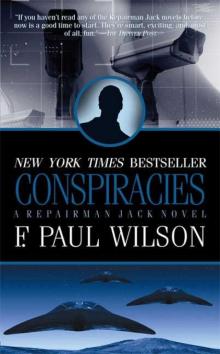 Conspircaies rj-3
Conspircaies rj-3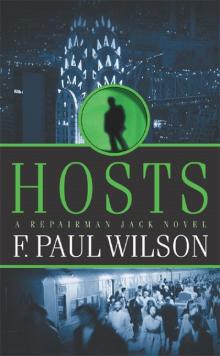 Hosts rj-5
Hosts rj-5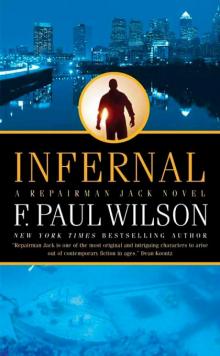 Infernal rj-9
Infernal rj-9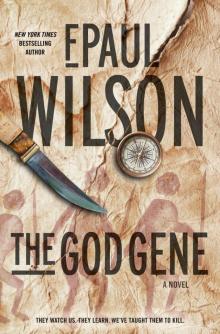 The God Gene: A Novel (The ICE Sequence)
The God Gene: A Novel (The ICE Sequence)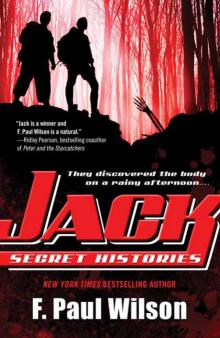 Secret Histories yrj-1
Secret Histories yrj-1